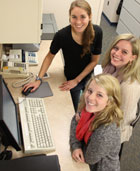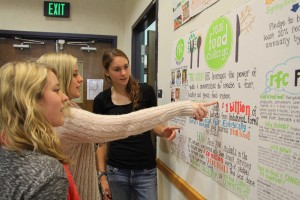Students lead initiative to bring “real” food to campus
 Julie Price ’14, Shannon Cochran ’14 and Courtney Walton ’16 all have one thing in common: a genuine care for sustainable food. That’s why, together, they are bringing the Real Food Challenge to Messiah College.
Julie Price ’14, Shannon Cochran ’14 and Courtney Walton ’16 all have one thing in common: a genuine care for sustainable food. That’s why, together, they are bringing the Real Food Challenge to Messiah College.
The Real Food Challenge is a nationwide initiative that aims to shift $1 billion of existing university food budgets away from industrial farms and junk food and towards real food—defined as ecologically sound, fair, humane and local—by 2020.
The Challenge begins with researching two months of dining’s purchases. Using invoices from October and February (chosen for seasonal variety) Price, Cochran and Walton sift through purchases and enter data such cost, brand and vendor into the Real Food Calculator. The students emphasize the Challenge is about much more than simply entering data though. They research each company to find out who is producing the food, where it is being grown and what the production process entails to decide if the food meets the necessary criteria.
“People don’t realize that where their food was produced can be a vital part of how healthy it is for them,” notes Cochran. “You see the way workers are treated at some companies and realize that eating their food funds that unfair treatment. It is important to make people on campus aware.”
Once all the data is compiled, the calculator computes the total percentage of dining’s real food purchases.
This spring, the students plan to present their findings to key campus stakeholders and advocate for making the Real Food Campus Commitment, meaning Messiah would commit to 20 percent real food by 2020.
“A lot of people may think 20 percent doesn’t seem like that much, but considering dining services spends more than $1 million per school year on food, 20 percent of that is a lot of money. In the scope of things it is very significant,” says Price.
Mark Wirtz, director of dining services, first approached the Office of Sustainability about this program and is looking forward to using this information to assess how dining can increase its real food offerings. After the students complete the research, Wirtz and his team plan to look at the top 50 purchased items by volume that don’t meet the real food requirements and look for alternatives that do. Once suitable alternate solutions have been found, dining will continue through the list, making a concerted effort to improve food quality in all of its campus locations.
Why real food?
 Messiah’s existing commitment to sustainability made this project a natural extension of the ongoing efforts around campus.
Messiah’s existing commitment to sustainability made this project a natural extension of the ongoing efforts around campus.
“I see it from three pillars of sustainability—social justice, care for the environment and an economics perspective,” says Price, “buying food from producers that are contributing to their communities, that have fair labor practices, and who have agricultural practices that don’t degrade the environment but improve it.”
Walton, a nutrition and dietetics major, emphasizes the health benefits of real food.
“Food is so important in how you nourish your body and how you care for it. Multiple studies show the more real food you consume, the more energy you have and the more ability you have to focus and be more productive.”
Training student leaders
The Real Food Challenge focuses primarily on colleges because it recognizes the power, leverage and voice that students have in making decisions on campus.
“It’s exciting to see students work as thought leaders, internal entrepreneurs, consultants, adding to the capacity to the departments around campus giving leadership,” says Director of Sustainability Craig Dalen. “Instead of complaining about the system or the establishment, they are wading through the nitty gritty, the very unattractive daily pieces to really help turn the dial of these large, macro pieces.”
Story by Erin Bray ’10. Photography by Megan Dobinson ’16.




